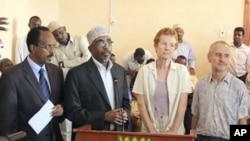A British couple who were freed Sunday by pirates in Somalia say they will return home to Britain "very soon". As their 13-month ordeal comes to an end,
Rachel and Paul Chandler spent their first night of freedom at the home of the British High Commissioner in Nairobi.
Soon after their release they were told that Paul Chandler's father died while they were in captivity.
Now they say they will return to their home country, Britain.
London-based piracy expert Roger Middleton says it will be good to have them back in Britain.
"It is excellent news that the Chandlers are coming home, they have been held for far too long. It must have been very difficult for them," he said. "The problem with ransoms, of course, is that every time a ransom is paid it does kind of perpetuate the problem of piracy. But we are stuck in a situation where there is not really an alternative to paying ransoms to get people released."
The Chandlers were seized from their yacht more than one year ago. The retired couple was sailing around the world and was kidnapped near the Seychelles. A $7-million ransom was initially demanded, but not met. Earlier this year $450,000 was reportedly handed over to the pirates, but that sum failed to secure their release.
Recently a further payment was made. Britain's foreign secretary has said the British government played no part in the payment of a ransom.
Middleton says Somali pirates are motivated by the high cash reward that can be earned.
"Piracy in 2009 probably generated something in the region of $100 million for Somalia," he said. "So this has become a very big business. And just to put that into some context, that makes it the second-biggest earner of foreign currency for the whole country so this is very important."
According to the International Maritime Bureau, Somali pirates have been responsible for at least 40 percent of piracy attacks this year.
International navies patrol the Gulf of Aden and the Somali basin, but maritime experts say pirates are ranging into areas where they were not previously known to operate, which makes the problem even harder to police.
Middleton says countries that are home to pirates often suffer similar plights - namely poverty and weak government. But he says Somalia's situation is unique.
"Somali piracy is primarily driven by a ransom culture, so it is about holding people and waiting for ransom to release them," he said. "Piracy in other parts of the world is very often more to do with stealing the goods or the ship itself and can be a lot more violent because of that."
The Chandlers say they were beaten while held in captivity. Paul Chandler thanked the Somali government for its help securing their release and said some of the ransom money had been paid by the global Somali Diaspora.
Pirates' Hostages to Return to Britain 'Very Soon'




